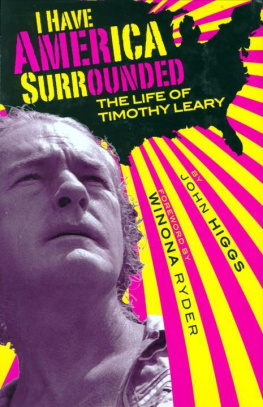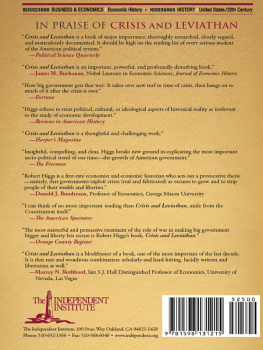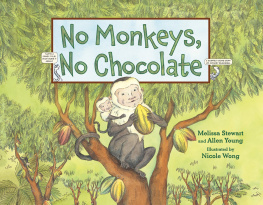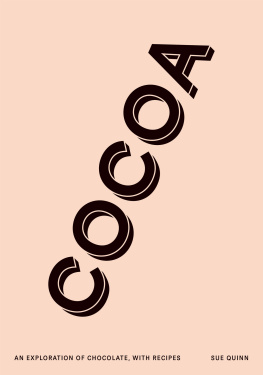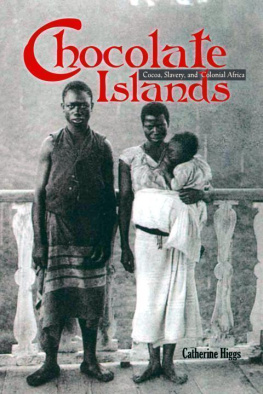Higgs - Chocolate Islands: Cocoa, Slavery, and Colonial Africa
Here you can read online Higgs - Chocolate Islands: Cocoa, Slavery, and Colonial Africa full text of the book (entire story) in english for free. Download pdf and epub, get meaning, cover and reviews about this ebook. City: Chicago;Athens, year: 2013, publisher: Chicago Distribution Center [distributor, Ohio University Press, genre: Detective and thriller. Description of the work, (preface) as well as reviews are available. Best literature library LitArk.com created for fans of good reading and offers a wide selection of genres:
Romance novel
Science fiction
Adventure
Detective
Science
History
Home and family
Prose
Art
Politics
Computer
Non-fiction
Religion
Business
Children
Humor
Choose a favorite category and find really read worthwhile books. Enjoy immersion in the world of imagination, feel the emotions of the characters or learn something new for yourself, make an fascinating discovery.

- Book:Chocolate Islands: Cocoa, Slavery, and Colonial Africa
- Author:
- Publisher:Chicago Distribution Center [distributor, Ohio University Press
- Genre:
- Year:2013
- City:Chicago;Athens
- Rating:4 / 5
- Favourites:Add to favourites
- Your mark:
- 80
- 1
- 2
- 3
- 4
- 5
Chocolate Islands: Cocoa, Slavery, and Colonial Africa: summary, description and annotation
We offer to read an annotation, description, summary or preface (depends on what the author of the book "Chocolate Islands: Cocoa, Slavery, and Colonial Africa" wrote himself). If you haven't found the necessary information about the book — write in the comments, we will try to find it.
Chocolate Islands: Cocoa, Slavery, and Colonial Africa — read online for free the complete book (whole text) full work
Below is the text of the book, divided by pages. System saving the place of the last page read, allows you to conveniently read the book "Chocolate Islands: Cocoa, Slavery, and Colonial Africa" online for free, without having to search again every time where you left off. Put a bookmark, and you can go to the page where you finished reading at any time.
Font size:
Interval:
Bookmark:
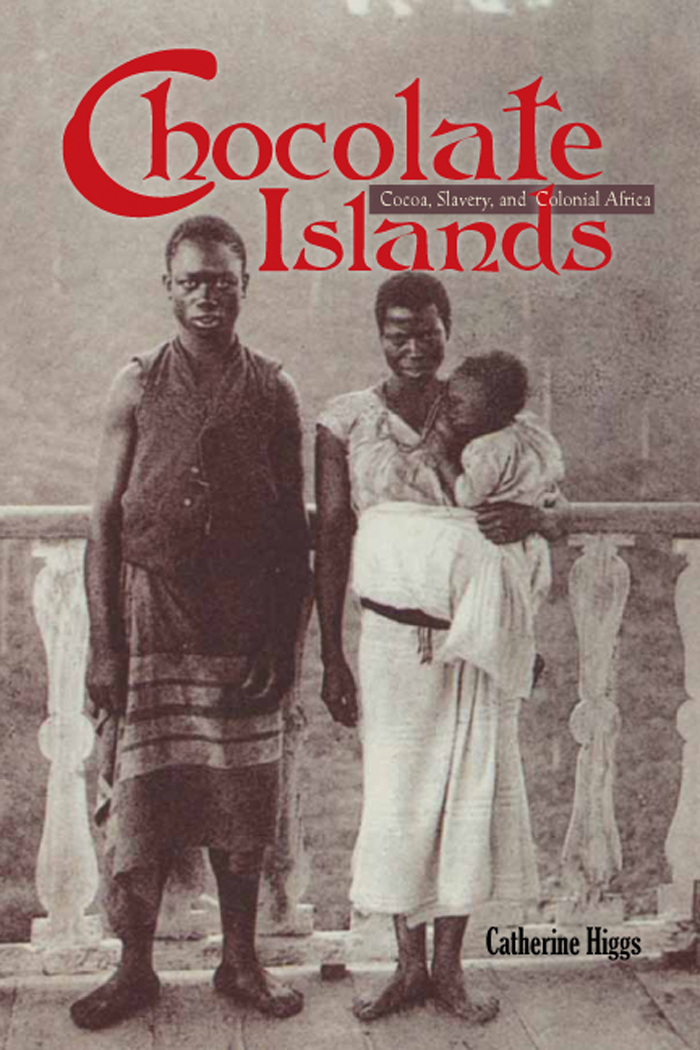
Catherine Higgs has combined careful academic research with the kind of skillful writing youd expect in a good historical novel.... The book is strikingly relevant to todays headlines. It is an excellent study for academics who want to know how to research at a professional level and then write well for the public, and it will strongly appeal to general readers.
Book News
Catherine Higgs writes about the chocolate islands with clarity and conviction, commanding the evidence while presenting an argument about the dignity of labor with an elegance of style. In terms of presentation, research and structure, the book is a tour de force.
David Birmingham, author of Portugal and Africa and Trade and Empire in the Atlantic, 1400 to 1600
Higgs takes us into the plantations of the chocolate islands and along the slave routes of southern Africa in this deeply researched and beautifully written investigation of slave, free, and coerced labor in early colonial Africa.
Robert Harms, author of The Diligent: A Voyage through the Worlds of the Slave Trade
Like Adam Hochschilds King Leopolds Ghost, Catherine Higgs takes us into another heart of darkness of colonial rule. Chocolate Islands is a compelling read examining how the British chocolate firm Cadbury Brothers investigated the use of slave labor in Portuguese colonies to produce cocoa. It raises challenging questions not only about how a business with a humanitarian streak dealt with the use of forced labor in the early twentieth century, but also about the labor practices of businesses in the twenty-first-century world.
Robert R. Edgar, editor of An African American in South Africa: The Travel Notes of Ralph J. Bunche
CHOCOLATE ISLANDS
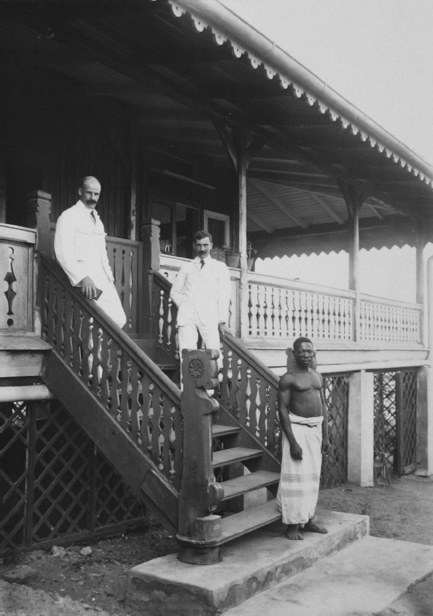
William A. Cadbury, Joseph Burtt, and an unidentified African man in Luanda, January 1909. Photograph in the Cadbury Papers 308, Cadbury Research Library, Special Collections, University of Birmingham, Birmingham, UK.
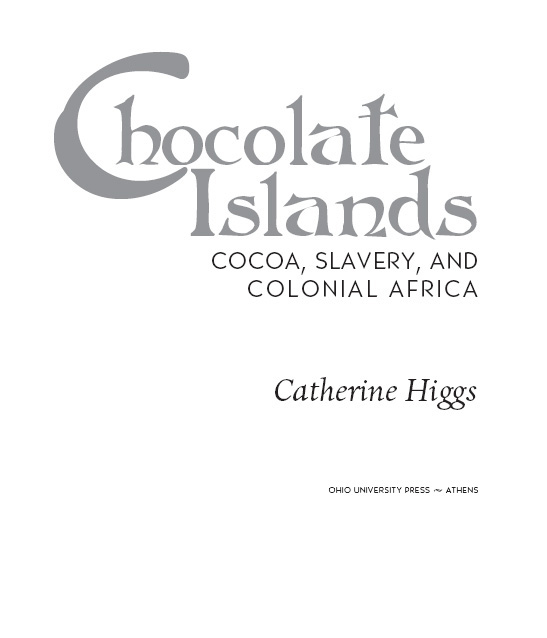
Ohio University Press, Athens, Ohio 45701
ohioswallow.com
2012 by Ohio University Press
All rights reserved
To obtain permission to quote, reprint, or otherwise reproduce or distribute material from Ohio University Press publications, please contact our rights and permissions department at (740) 593-1154 or (740) 593-4536 (fax).
Printed in the United States of America
Ohio University Press books are printed on acid-free paper 
First paperback printing in 2013
ISBN 978-0-8214-2074-4
HARDCOVER 20 19 18 17 16 15 14 13 5 4 3 2
PAPERBACK 20 19 18 17 16 15 14 13 5 4 3 2 1
Library of Congress Cataloging-in-Publication Data
Higgs, Catherine.
Chocolate islands : cocoa, slavery, and colonial Africa / Catherine Higgs.
p. cm.
Includes bibliographical references and index.
ISBN 978-0-8214-2006-5 (hc : alk. paper) ISBN 978-0-8214-4422-1 (electronic) 1. Forced laborSo Tom and PrncipeHistory. 2. SlaverySo Tom and PrncipeHistory. 3. CacaoHarvestingSo Tom and PrncipeHistory. 4. CacaoHarvestingMoral and ethical aspects. 5. Cacao growersSo Tom and PrncipeHistory. 6. PortugalColoniesAfricaAdministration. 7. Burtt, Joseph, 18621939TravelAfrica, West. 8. Cadbury, William A. (William Adlington), 18671957. 9. Cadbury BrothersHistory. I. Title.
HD4875.S36H55 2012
331.76337409670904dc23
2012009341
FOR KATHY JOINER MILBURN AND JEFF MILBURN
FIGURES
Frontispiece. William A. Cadbury, Joseph Burtt, and an unidentified
MAPS
This book is about an Englishmans journey through Africa in the first decade of the twentieth century, undertaken as European colonial powers were tightening their grip on the continent. The travelers name was Joseph Burtt. He had been hired by William A. Cadbury on behalf of the British chocolate firm Cadbury Brothers Limited to determinein response to an emerging international controversyif slaves had harvested the cocoa the company was purchasing from the Portuguese West African colony of So Tom and Prncipe.
Burtts voyage took him from innocence and credulity to outrage and activism. Between June 1905 and March 1907, he traveled to the islands of So Tom and Prncipe, then south along the coast to the large Portuguese colony of Angola, to Mozambique in Portuguese East Africa, and to the Transvaal Colony in British southern Africa. Through his eyes, we learn about the often complacent British and Portuguese attitudes toward work, slavery, race, and imperialism in the early twentieth century. He visited agricultural estatesroas on So Tom and Prncipe and fazendas in Angola. He talked to diplomats, journalists, and European and African businesspeople, and he traced the slave route through Angolas interior. He conferred with mine owners in the Transvaal and colonial officials in Mozambique, which supplied most of the labor for the Transvaals mines. He was not the first man to make such a trip; readers interested in the broader literature into which this narrative of his experiences fits may wish to read A Note on Sources at the end of this book.
Burtt wrote a stream of letters to Cadbury recording what he saw and whom he met. He was not a flawless observer, but this should not surprise us, living as we do in an age that has long abandoned the pretense of objectivity. What Burtt wrote prompted Cadbury Brothers Limited to seek alternate sources of cocoa. The report he prepared summarizing his observations was submitted to the British and the Portuguese governments, and it helped reform the recruitment and treatment of laborers. Joseph Burtt was no casual visitor to Africa: he traveled with a purpose, and what he saw and what he
I am grateful to the many librarians, archivists, colleagues, and friends who have made this book possible. Dorothy Woodson, curator of the African Collection at Yale University, gave me access to the collection of James Duffys papers donated by his widow in 2000. They restored to the archival record the set of letters Joseph Burtt wrote to William Cadbury from Africa between 1905 and 1907. Copies of the letters have been deposited in the Cadbury Research Library, Special Collections, at the University of Birmingham, where Helen Fisher and Philippa Bassett assisted me. Sarah Foden gave me access to the small archive still maintained by Cadbury Information Services (now part of Kraft Foods). Two summer Professional Development Awards from the University of Tennessee funded my 2002 visit to Birmingham (I thank Isabel Hackett for her kind hospitality) and my 2003 visit to So Tom. I am grateful to Augusto Nascimento for introducing me to the staff at the Arquivo Histrico de So Tom and Prncipe and helping me negotiate the archive at a moment when I was just learning Portuguese. Nascimento and Eugnia Rodrigues (both of the Instituto de Investigao Cientfica Tropical [IICT]) also graciously hosted me in Lisbon. A 2004 grant from the Luso-American Foundation funded a summer of research at the Biblioteca Nacional in Lisbon. I owe a special debt of gratitude to Helena Grego and Cristina Matias of the Sociedade de Geografia de Lisboa, who in 2006 kindly helped me track down numerous references. My debt to Gerhard Seibert of the Centro de Estudos Africanos (ISCTE-IUL) is considerable. Among many favors over the years, he read this manuscript and introduced me to the great-grandson of Francisco Mantero, who shares his name. I thank Kate Burlingham for her research assistance at the Arquivo Histrico Nacional de Angola, as well as the librarians and archivists at the Rhodes House Library at Oxford University; the Biblioteca Nacional, the Arquivo Histrico Ultramarino, and the Arquivo Histrico Diplomtico in Lisbon; and the Arquivo Histrico de Moambique in Maputo.
Font size:
Interval:
Bookmark:
Similar books «Chocolate Islands: Cocoa, Slavery, and Colonial Africa»
Look at similar books to Chocolate Islands: Cocoa, Slavery, and Colonial Africa. We have selected literature similar in name and meaning in the hope of providing readers with more options to find new, interesting, not yet read works.
Discussion, reviews of the book Chocolate Islands: Cocoa, Slavery, and Colonial Africa and just readers' own opinions. Leave your comments, write what you think about the work, its meaning or the main characters. Specify what exactly you liked and what you didn't like, and why you think so.

